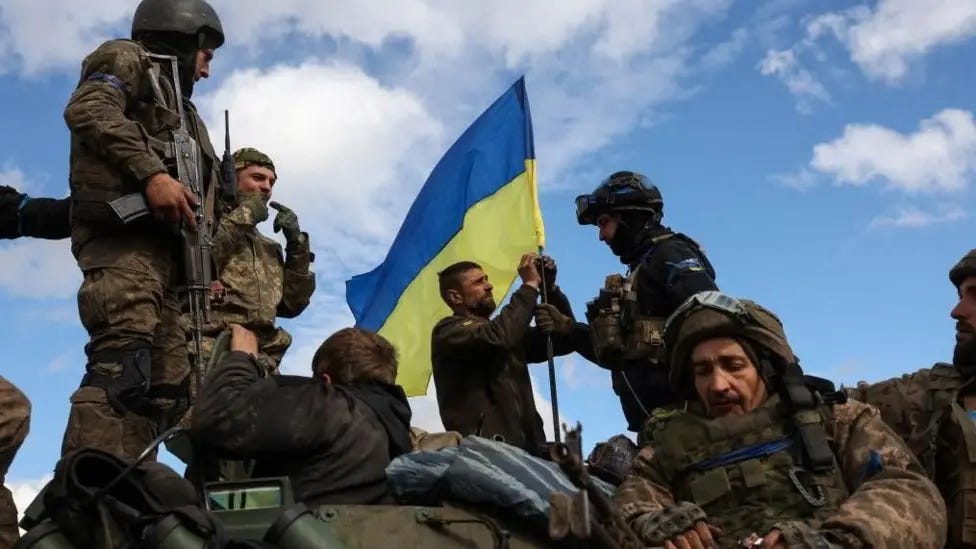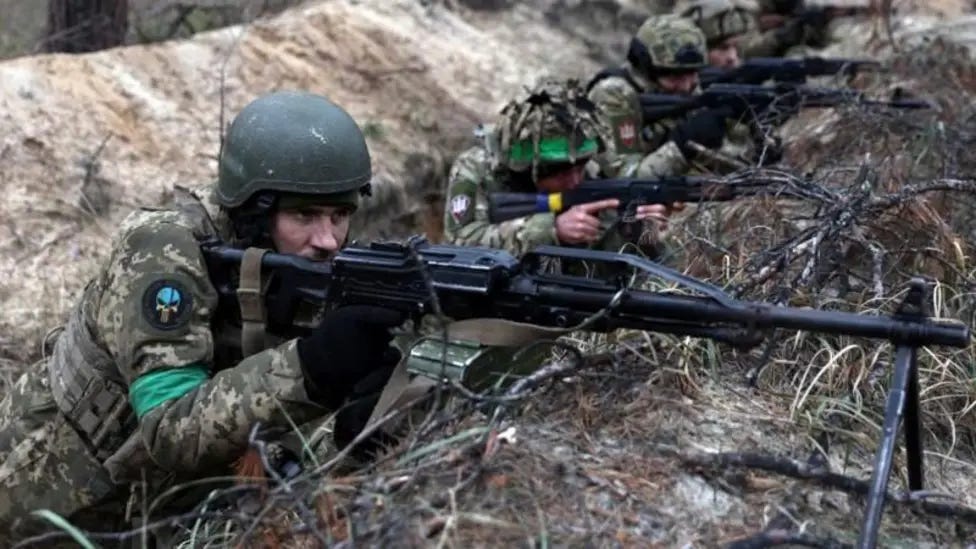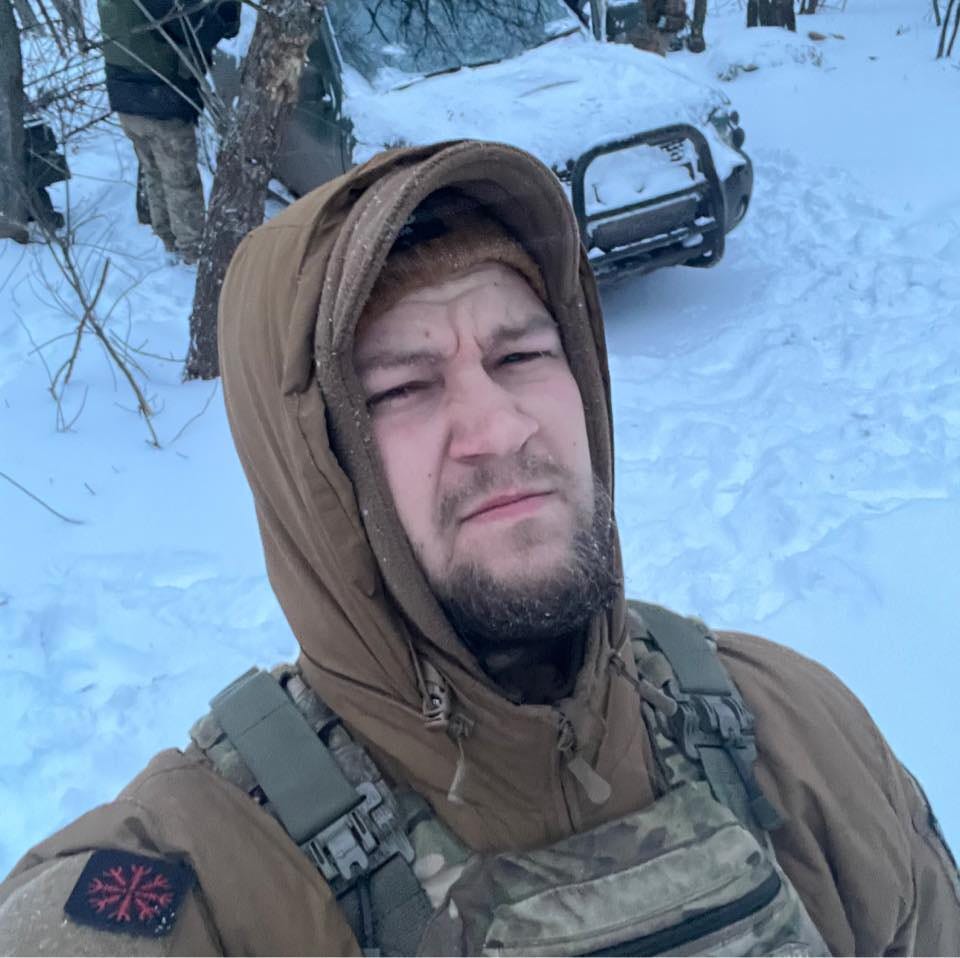1000 days into the war, the number of Ukrainian soldiers quitting the battlefield is on the rise
Exhaustion, conflict with commanders, and zero prospect of demobilisation – morale is suffering on many fronts.
By Mariana Matveichuk, BBC Ukraine.
Since the beginning of the full-scale war in Ukraine, 95,000 criminal cases have been opened in respect of unauthorised absence from military units or following desertion: in other words, roughly a tenth of the entire Ukrainian army has walked away from battle. What’s behind this astonishing figure?
“They opened a criminal case against me, but I am not going to hide from them,” says a soldier with the call sign ‘Wild Boar’, who went absent without leave – AWOL – six months ago, following a falling-out with his commanding officer.
He was an acting platoon commander at the time. And when ‘Wild Boar’ left, about two dozen comrades went with him.
Some returned to service in other brigades. The others, he says, are still listed as AWOL from the military unit.
“The day after I quit, at the end of April, I gave all my information to the Military Law Enforcement Service and State Bureau of Investigation (the SBI), asking them to help resolve the situation and put me in touch with the investigating officer,” he says. “In more than six months, no one has contacted me.”
He approached the SBI again three months later, and got hold of a case number. He asked again for the contact information for his case officer, but it was denied. They said his details would be forwarded to the investigation, which would be in touch. But nobody has contacted him since.
The BBC asked the Military Law Enforcement Service and the SBI to provide the exact number of deserters and soldiers who have left their units without authorisation. They would not do so. But data published on the website of the Prosecutor-General’s Office allowed us to work out that more than 95,000 criminal cases related to unauthorised absence and desertion have been opened since the start of the full-scale war in Ukraine.
At the beginning of 2024, Volodymyr Zelensky announced that 880,000 people were serving in the Armed Forces of Ukraine – and by the end of October, the Secretary of the National Security and Defence Council of Ukraine, Oleksandr Lytvynenko, stated that 1,050,000 citizens had been conscripted into the nation’s military.
Even if the conclusions we have drawn are merely estimates, the implication is that something like a tenth of the army has either gone AWOL or deserted.
Desertion and unauthorised absence: the numbers
By October, the SBI had opened 40,659 criminal cases related to unauthorised absence and another 19,826 cases of desertion – only for 2024. The total is two and half times the number for last year. And in 2022, the figure for both categories of offence was less than 10,000.
Sources in Ukraine’s General Staff, speaking on condition of anonymity, told the BBC the true numbers are even higher – from 100,000 to 150,000 cases overall.
Unauthorised absence is when a serving soldier leaves their post without permission from his commanding officer or without another valid reason. Desertion is when the individual intends to avoid military service altogether. Both offences carry criminal liability. The punishments are comparable – from 5 to 10 years behind bars in the case of those who are AWOL, and from 5 to 12 years for convicted deserters.
The reasons for unauthorised absence and desertion
So why are the numbers for soldiers leaving service rising so sharply now? A high-ranking official told us the main reasons are sheer fatigue and ‘busification’ – the practice of enforced conscription in which draftees are rounded up in minivans.
He said in the case of unwilling draftees, the men quitting their units are those who were forced into service and sent to the front with insufficient training. As for fatigue, many soldiers are mentally exhausted after fighting from the very start of the full-scale invasion, their tiredness exacerbated by the lack of rotation, or clear terms of service, or leave honoured as it should have been.
25-year-old Denys left his unit because of exhaustion: “I am tired out through constant fighting,” he says by way of explanation. He has been in the army for more than five years – in essence, all his adult life. Denys signed a contract in 2019 for three years, but with the outbreak of war it was extended until martial law is rescinded.
He is ready to go back to duty, but not to the frontlines: “About 40 kilometres from the enemy would suit me fine.”
Isn’t Denys afraid of being brought to court?
“I believe I have fought too long to be sent off to jail.”
Additional causes of unauthorised absence and desertion
Roman Lykhachev, a lawyer at the Veterans Support Centre, adds two more possible reasons why soldiers are leaving the battlefield: errors of command that lead to avoidable deaths among personnel, and the assignment of conscripts to roles they have no expertise in – such as an engineer being sent into battle as a rifleman.
Karpo, name changed, explains why he went AWOL:
“We’d had heavy losses, we were exhausted and sick, and waiting to be rotated out. Instead, we got told to go to the front, dig in near an enemy tank, and sit there quiet as mice. When we refused, we were threatened and treated with contempt.”
Karpo had fought since the start of the invasion. He was wounded, came back to duty, and received the Golden Cross.
“The war has changed over these two and a half years,” he says. “The vast numbers of drones now make things far more dangerous than they were at the start, when we took on risks more easily.”
Getting into conflict with his commanders was why ‘Wild Boar’ went AWOL. “It was cool to fight for the first year. The officers respected you, you felt motivated. I would happily have kept on fighting with ‘Fisherman’, my first commanding officer.”
‘Wild Boar’ signed up in March 2022, just after the full-scale invasion began, arriving at the frontline directly from Paris. He spent the rest of the year there. A medical commission subsequently declared him only partially fit – meaning he was now only suitable for duties at the rear. He qualified as a drone pilot.
It was an order to return to the front that he thought unjust that caused him to leave his unit.
"It’s not that I am refusing to serve. Just not in this unit, and not under this leadership,” he wrote in a statement to his commanding officer. “I feel my life is in danger there and I am constantly on the receiving end of moral mistreatment.”
The defence ministry responded to his complaint by saying it had found no evidence of unlawful actions by his command.
The decriminalisation of unauthorised absence
Two months ago, in September, Ukraine’s parliament voted to decriminalise unauthorised absence and desertion for first-time offenders.
The idea is to encourage soldiers to go back to service – which they can initiate by submitting a statement to the prosecutor, investigator or court. If the unit commander consents to take them back, they are exempted from criminal liability.
But this last hurdle – the officer’s agreement – can be onerous for those who have come into conflict with their leadership, like ‘Wild Boar’ and Karpo.
In early October, the SBI reported the first successful cases of soldiers going back to the frontlines, including some who had quit in 2024, or had been AWOL in 2023 or 2022.
Taras, name changed, was among those the new law allowed to resume service. He had left his unit in June after a mission that was supposed to last eight days but went on for 31. When he returned from the fighting, he had an argument with the battalion senior sergeant.
“When you get back from the frontlines, everything you’ve been through heightens your sense of justice,” Taras explains. “I stood up for my guys, and it was recorded as unauthorised absence.”
He immediately filed a complaint with the Military Law Enforcement Service, stating he was willing to continue serving in another unit. Shortly after, the police located him and offered him an opportunity to return to the military under the decriminalisation provision.
“So long as I’m healthy, I’ll fight,” Taras says.
After the pre-trial investigation, he was transferred to a reserve battalion formed for soldiers who had left their units. Last week, Taras resumed his duties as a platoon commander – in another military detachment.
“My fellow soldiers are still a bit wary of me,” Taras says about his return. “I think in their place, I’d be the same.”
Decriminalisation: necessary but late
"Decriminalisation is a big step forward," says lawyer Anton Nezhyvyi, "but it came a little too late in the day."
Of the thousands of criminal cases related to unauthorised absence and desertion, very few make it to court; mainly because of the overwhelming caseload, experts say.
According to the Prosecutor General’s Office, of the more than 40,000 AWOL cases filed this year, only 2,758 reached the courts. Among them, 1,622 cases ended in convictions, while 1,135 saw motions for exemption from criminal liability.
“There simply aren’t enough resources to detain so many violators,” explains Nezhyvyi. “The numbers far exceed all the employees of the SBI and the Military Law Enforcement Service put together.”
Some brigades openly urge those who have quit to return.
“The K-2 Battalion is waiting for you after unauthorised absence. No reproaches or prejudice,” promises one such unit.
Reintegrating tens of thousands of soldiers who have gone AWOL or deserted is, after all, much cheaper and faster than mobilising and training brand new recruits.
The problem of demobilisation
A further reason behind the rise in unauthorised absence and desertion is the lack of a demobilisation mechanism. When the new law on mobilisation was passed by parliament at the start of this year, the government promised to elaborate clear terms of service. But the General Staff urged politicians to drop the provision and think again.
A new bill to clarify demobilisation timelines was supposed to be promulgated by the end of this year, but it has yet to be seen. Members of the defence committee in parliament told the BBC that Ukraine has neither the reserves nor political will to pass a new law on mobilisation.
Ukraine’s leadership unofficially accepts that demobilisation is beyond reach at a time of war – there are simply insufficient replacement personnel. And so it remains a mystery what mechanisms the Ministry of Defence will employ to dismiss soldiers from service.
Meanwhile, speaking to parliament at the end of October, Oleksandr Lytvynenko of the National Security and Defence Council announced that an additional 160,000 people would need to be mobilised simply to "fulfil the staffing of military units to 85%."
A demand for clear service terms
"I am going on unauthorised absence until clear service terms are established," Serhii Hnezdilov publicly declared at the beginning of September. He is a soldier of the 56th Mariupol Separate Mechanised Brigade.
"I am ready to return to service if the Ministry of Defence presents a bill with clear service terms," he repeated when he came to court on October 11. The hearing detained him for another two months without right to bail. Hnezdilov faces up to 12 years in jail for deserting.
He is 24, a year younger than Denys, whose ‘war fatigue’ compelled him to go AWOL at roughly the same time. Both men were volunteers, and both signed contracts before the war began – and in both cases, the contracts should long since have expired. Yet their terms of service remain undefined – just as the length of the war remains uncertain.
Denys left his unit because of exhaustion. Hnezdilov left his to draw attention to how widespread exhaustion has become. Not all support him.
“The terms of service do need to be defined. It’s long overdue. But not at any cost, not just by quitting and going AWOL,” says Masi Nayem, a Ukrainian soldier who is the co-founder of the ‘Principle’ Human Rights Centre for Military Assistance.
Nayem calls Hnezdilov’s actions “immoral” with respect to the dead and wounded, and “dishonest” towards those who are still fighting. And they might harm the state.
A source in the General Staff told the BBC that Hnezdilov’s actions will not affect the passage of a law on terms of service – while law enforcement officials says the publicity he has drawn means his punishment will be as severe as possible, unless he elects to go back to the military.
"The result is the Russians rip through our defences, outflank better motivated troops, and these are the ones that die. But given the current shortage of men, deserters are now allowed to come back without being punished. It is becoming a deadly recipe."
What soldiers say
"Everyone wants to return to the armed forces. But to units where they want to be, where they will be respected," explains ‘Wild Boar’.
But breaking the law in order to protest the violation of the law is not the way forward, however justified it may seem, says Masi Nayem.
"If unauthorised absence becomes a fashion, we simply won't have a country," he says bluntly.
Yet Nayem notes that soldiers are the most vulnerable group among Ukraine’s citizens: penalties for offences including going AWOL and deserting were tightened up by parliament last January, with a “law that does not permit soldiers the concept of mitigating circumstances," he continues.
A first-time offender will not be punished if they return to service under the new law. But a soldier who refuses, or goes AWOL a second time, cannot claim mitigating circumstances at trial. Instead, they face the maximum punishment foreseen by the criminal code.
“Consider this: a rapist is allowed mitigating circumstances, but a soldier is not,” Nayem says.
It is clear in his opinion that the reasons for unauthorised absence must be properly studied: to determine what proportion are due to bad command decisions, and which cases stem from poor training or low morale.
The problem of potentially incompetent commanders is not simple either. On the one hand, Nayem says, it is not straightforward to hold commanders accountable for alleged violations. On the other, their mass punishment would discourage officers from taking the initiative when it’s needed.
“My view of those who go AWOL is negative,” says a commander of an aerial reconnaissance unit interviewed by the BBC. "Before, I thought that there could be different circumstances, but now I increasingly tend towards the view that we are suffering losses in part because unmotivated people are just abandoning their positions and walking away.
"The result is the Russians rip through our defences, outflank better motivated troops, and these are the ones that die. But given the current shortage of men, deserters are now allowed to come back without being punished. It is becoming a deadly recipe."
What the state is doing
State officials are reluctant to comment on the tens of thousands of cases related to unauthorised absence and desertion. At the SBI, and the military police, they believe discussing the matter damages morale and the reputation of Ukraine’s armed forces.
But soldiers say the instances of men going AWOL have just as much impact on morale. In some brigades, the problem is chronic, while in others they find ways of coping.
"In my whole career, I’ve only had one complaint from a soldier from the 3rd Assault Brigade," says the lawyer Anton Nezhyvyi. "Although everyone knows where they are deployed in the most dangerous spots. Their thing is to try to solve all command problems on the ground locally."
In response to a BBC enquiry, the General Staff stated that "information regarding morale, psychological state and military discipline" is classified and for official use only.
The General Staff went on to say that commanders at every level of the Military Law Enforcement Service are addressing the "causes and conditions" of conflicts that lead to unauthorised absence. They mentioned "improving communication between the command and personnel" and "an individualised approach to resolving the problematic issues of individual soldiers."
Given the number of AWOL cases, the Military Law Enforcement Service has its work cut out.
"’A soldier shouldn't think, a soldier should dig’," his commander told Taras. "If we had only been digging and not thinking, we would have been killed," Taras adds.
On November 12, President Zelensky announced that transfers between military units would be simplified. As from now, there’s an app for that: ‘Army+’. Requests will be digitally collated and processed, and operational commanders will not need to be involved. Transfer decisions are to be reached within 72 hours.
The app will also enable the General Staff and defence ministry to use the data to assess the performance of commanding officers.
And soldiers like ‘Wild Boar’ should now have a means of sorting out conflicts without leaving the battlefield.
“They made the right decision,” he says of the new decree. “Now guys will get to go to the right brigade. And everyone will be able to see which units have got problems.”
This is a condensed translation of an article published on the BBC Ukraine website. The full version in Ukrainian can be read here.
You can read this story in Russian here.
English version edited by Chris Booth.
Russia's runaway soldiers
Court records and social media chat groups show record numbers of Russian soldiers are being prosecuted for desertion, many are being helped and hidden by their families.











